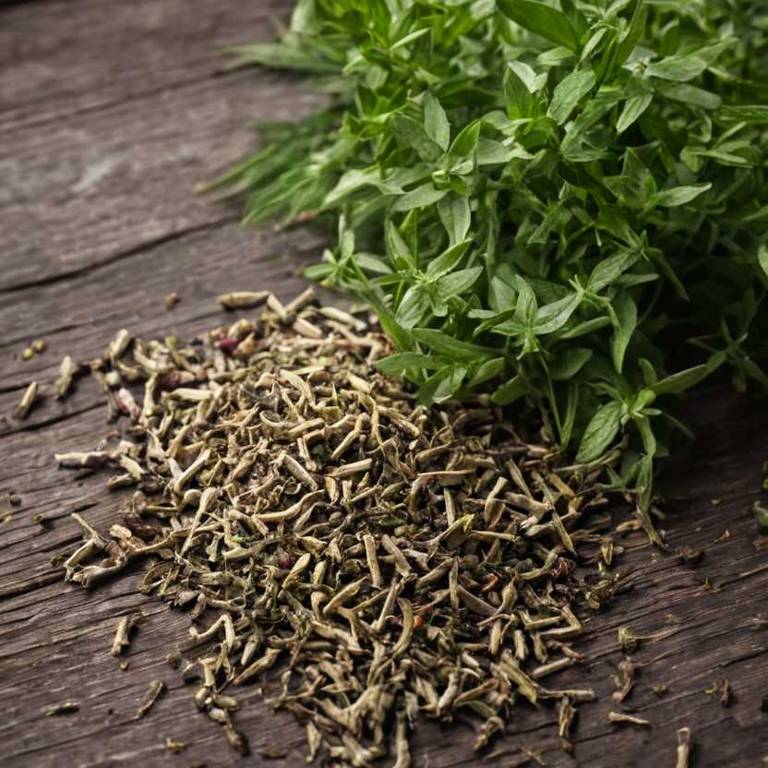10 Best Polygonum Aviculare Health Benefits

Polygonum aviculare, commonly known as prostrate knotgrass, offers several health benefits due to its rich content of antioxidants, anti-inflammatory compounds, and essential nutrients.
It has been traditionally used in herbal medicine to support digestive health and alleviate symptoms of gastrointestinal disorders. The plant contains flavonoids and tannins that may help reduce inflammation and oxidative stress in the body. Additionally, Polygonum aviculare is believed to have diuretic properties that can aid in detoxification and fluid balance.
However, more scientific research is needed to fully validate its potential therapeutic uses and ensure its safety for long-term consumption.
1. Reduces inflammation
Polygonum aviculare reduces inflammation by containing bioactive compounds such as flavonoids and tannins, which have potent anti-inflammatory properties.
These compounds inhibit the production of pro-inflammatory cytokines and reduce oxidative stress in the body. It has been traditionally used in herbal medicine to treat inflammatory conditions such as arthritis and skin disorders. Modern research supports its efficacy in mitigating inflammation through multiple biochemical pathways.
Incorporating Polygonum aviculare into dietary or supplemental regimens may offer a natural approach to managing chronic inflammation.
2. Improves digestion
Polygonum aviculare improves digestion by containing compounds that stimulate the production of digestive enzymes, aiding in the breakdown of food more efficiently.
Its high fiber content helps promote regular bowel movements and prevent constipation, supporting overall gastrointestinal health. The plant also has mild laxative properties that can relieve digestive discomfort and ease the passage of stool. Additionally, Polygonum aviculare may help reduce bloating and gas by improving the motility of the digestive tract.
Regular consumption of this herb can contribute to a healthier digestive system and enhance nutrient absorption.
3. Boosts immunity
Polygonum aviculare boosts immunity by containing bioactive compounds such as flavonoids and polysaccharides, which have been shown to enhance the body's defense mechanisms.
These compounds may stimulate the production of immune cells like lymphocytes and macrophages, thereby improving the body's ability to fight off infections. Additionally, the plant's antioxidant properties help reduce oxidative stress, which can weaken the immune system over time. Studies suggest that regular consumption of Polygonum aviculare may support overall immune function and reduce the risk of illness.
Its traditional use in herbal medicine further highlights its potential role in promoting immune health.
4. Supports skin health
Polygonum aviculare supports skin health by providing essential nutrients that promote skin regeneration and repair.
Its rich content of antioxidants helps neutralize free radicals, reducing oxidative stress that can damage skin cells. The plant also contains compounds that may enhance moisture retention, leading to improved skin hydration and a healthier complexion. Additionally, Polygonum aviculare has anti-inflammatory properties that can soothe irritations and reduce redness.
These combined benefits make it a valuable natural ingredient for maintaining and improving overall skin health.
5. Enhances circulation
Polygonum aviculare enhances circulation by promoting the dilation of blood vessels and improving blood flow throughout the body.
This herb contains compounds that support cardiovascular health, helping to reduce the risk of circulatory disorders. Its ability to improve microcirculation can aid in delivering oxygen and nutrients more efficiently to tissues. Regular use of Polygonum aviculare may also help alleviate symptoms related to poor circulation, such as swelling and fatigue.
Overall, this plant serves as a natural aid in maintaining healthy blood flow and supporting the body's circulatory system.
6. Aids weight loss
Polygonum aviculare aids weight loss by promoting metabolic efficiency and reducing appetite.
It contains compounds that may enhance fat oxidation and support the body's ability to burn calories more effectively. Studies suggest that its bioactive ingredients can help regulate blood sugar levels, which in turn may prevent spikes that lead to cravings and overeating. Additionally, the plant's diuretic properties may contribute to a feeling of fullness, aiding in calorie control.
As a result, incorporating Polygonum aviculare into a balanced diet and exercise routine may support overall weight management efforts.
7. Promotes liver health
Polygonum aviculare promotes liver health by supporting detoxification processes and reducing oxidative stress within the liver.
Its active compounds, such as flavonoids and tannins, have been shown to protect liver cells from damage caused by toxins and free radicals. Studies suggest that Polygonum aviculare may enhance the liver's ability to regenerate and maintain its functional integrity. This herb is also believed to regulate liver enzyme levels, contributing to improved metabolic function.
As a result, it is often used in traditional medicine to support overall liver wellness and prevent liver-related disorders.
8. Helps detoxify body
Polygonum aviculare helps detoxify body by supporting the liver's natural ability to filter toxins.
This herb contains compounds that may enhance the production of enzymes involved in detoxification processes. It is believed to aid in the elimination of heavy metals and other harmful substances from the body. Regular consumption of Polygonum aviculare may promote overall metabolic health.
Its detoxifying properties make it a valuable addition to natural health regimens.
9. Relieves muscle pain
Polygonum aviculare relieves muscle pain due to its anti-inflammatory and analgesic properties.
The plant contains compounds such as flavonoids and tannins that help reduce inflammation and soothe muscle discomfort. It has been traditionally used in herbal medicine to treat conditions like sprains, strains, and rheumatic pain. Studies suggest that its active components may inhibit pain signals and promote muscle recovery.
Incorporating Polygonum aviculare into treatments can offer a natural alternative for managing muscle-related ailments.
10. Improves heart health
Polygonum aviculare improves heart health by reducing oxidative stress and inflammation, which are key contributors to cardiovascular diseases.
This plant contains bioactive compounds such as flavonoids and polyphenols that help in lowering cholesterol levels and improving blood circulation. Its antioxidant properties protect the heart muscles from damage caused by free radicals. Studies suggest that regular consumption of Polygonum aviculare may help in managing hypertension and preventing plaque buildup in arteries.
Overall, it supports overall cardiovascular function and may be a valuable natural supplement for heart health.